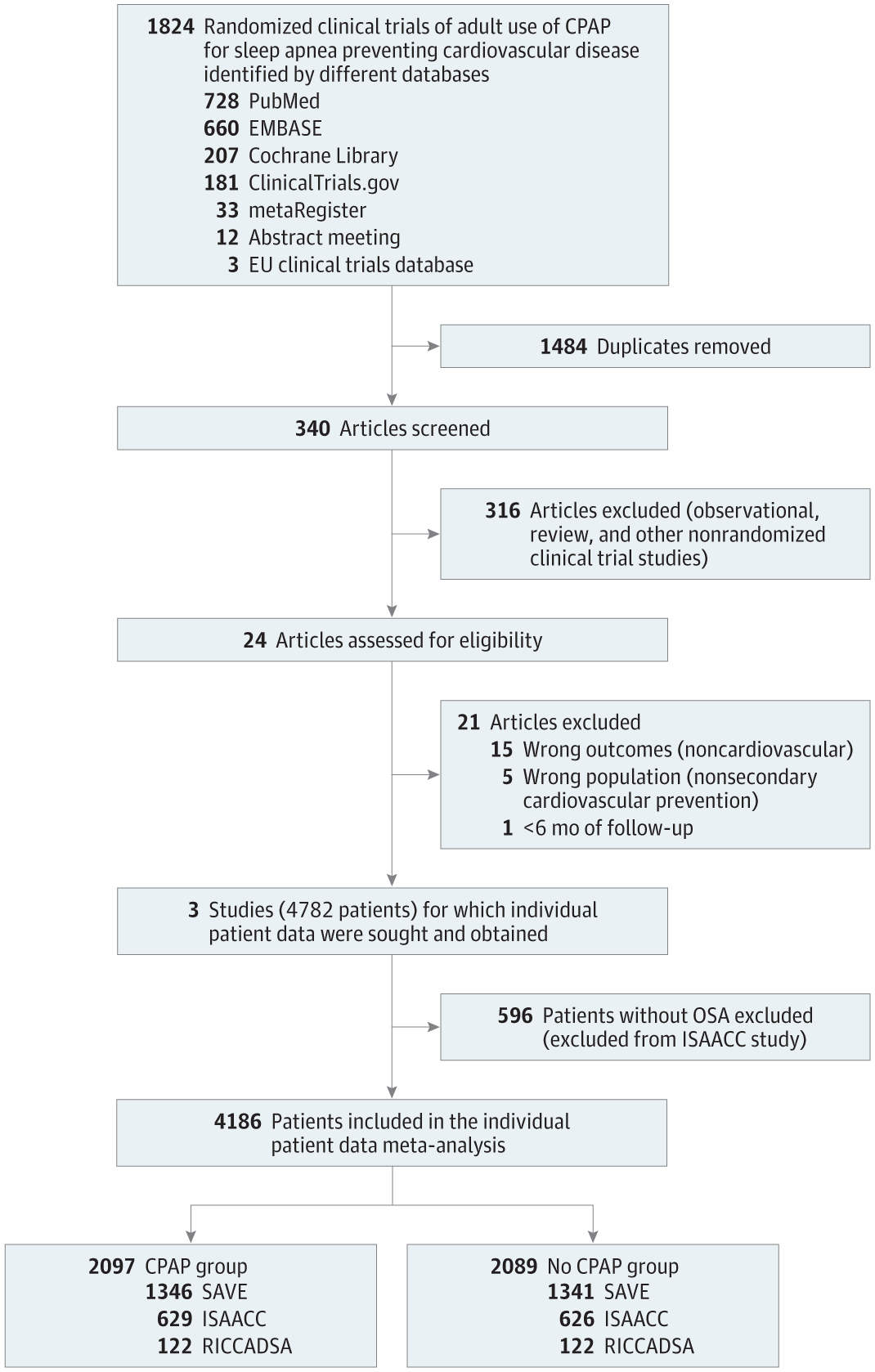Cardiovascular
Adherence to CPAP Treatment and the Risk of Recurrent Cardiovascular Events
Key Points
Question
Is continuous positive airway pressure (CPAP) treatment for obstructive sleep apnea (OSA) associated with a decreased risk of cardiovascular adverse events in participants with both OSA and established cardiovascular disease?
Findings
This systematic review and individual participant data (IPD) meta-analysis of 3 randomized clinical trials including 4186 patients with IPD showed that whereas the IPD meta-analysis based on intention to treat reported no effect of CPAP treatment, the adherent use of CPAP treatment (≥4 hours/day) is associated with a reduced recurrence risk of major adverse cardiac or cerebrovascular events (MACCEs) with a significant hazard ratio of 0.69.
Meaning
Patients with established cardiovascular disease and OSA who used CPAP for 4 or more hours per day had a significantly lower risk of MACCEs than those who used CPAP less than 4 hours per day.
Importance
The effect of continuous positive airway pressure (CPAP) on secondary cardiovascular disease prevention is highly debated.
Objective
To assess the effect of CPAP treatment for obstructive sleep apnea (OSA) on the risk of adverse cardiovascular events in randomized clinical trials.
Data Sources
PubMed (MEDLINE), EMBASE, Current Controlled Trials: metaRegister of Controlled Trials, ISRCTN Registry, European Union clinical trials database, CENTRAL (Cochrane Central Register of Controlled Trials), and ClinicalTrials.gov databases were systematically searched through June 22, 2023.
Study Selection
For qualitative and individual participant data (IPD) meta-analysis, randomized clinical trials addressing the therapeutic effect of CPAP on cardiovascular outcomes and mortality in adults with cardiovascular disease and OSA were included.
Data Extraction and Synthesis
Two reviewers independently screened records, evaluated potentially eligible primary studies in full text, extracted data, and cross-checked errors. IPD were requested from authors of the selected studies (SAVE [NCT00738179], ISAACC [NCT01335087], and RICCADSA [NCT00519597]).
Main Outcomes and Measures
One-stage and 2-stage IPD meta-analyses were completed to estimate the effect of CPAP treatment on risk of recurrent major adverse cardiac and cerebrovascular events (MACCEs) using mixed-effect Cox regression models. Additionally, an on-treatment analysis with marginal structural Cox models using inverse probability of treatment weighting was fitted to assess the effect of good adherence to CPAP (≥4 hours per day).
Results
A total of 4186 individual participants were evaluated (82.1% men; mean [SD] body mass index, 28.9 [4.5]; mean [SD] age, 61.2 [8.7] years; mean [SD] apnea-hypopnea index, 31.2 [17] events per hour; 71% with hypertension; 50.1% receiving CPAP [mean {SD} adherence, 3.1 {2.4} hours per day]; 49.9% not receiving CPAP [usual care], mean [SD] follow-up, 3.25 [1.8] years). The main outcome was defined as the first MACCE, which was similar for the CPAP and no CPAP groups (hazard ratio, 1.01 [95% CI, 0.87-1.17]). However, an on-treatment analysis by marginal structural model revealed a reduced risk of MACCEs associated with good adherence to CPAP (hazard ratio, 0.69 [95% CI, 0.52-0.92]).
Conclusions and Relevance
Adherence to CPAP was associated with a reduced MACCE recurrence risk, suggesting that treatment adherence is a key factor in secondary cardiovascular prevention in patients with OSA.

